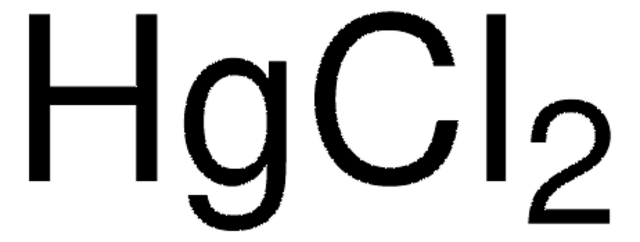P5271
Potassium dichromate
ReagentPlus®, ≥99.5%
Synonym(s):
Potassium bichromate
About This Item
Recommended Products
Quality Level
product line
ReagentPlus®
Assay
≥99.5%
form
powder
reaction suitability
reagent type: oxidant
pH
3.6 (100 g/L)
mp
398 °C (lit.)
SMILES string
[K+].[K+].[O-][Cr](=O)(=O)O[Cr]([O-])(=O)=O
InChI
1S/2Cr.2K.7O/q;;2*+1;;;;;;2*-1
InChI key
KMUONIBRACKNSN-UHFFFAOYSA-N
Looking for similar products? Visit Product Comparison Guide
Related Categories
Application
- For the oxidation of alcohols to aldehydes.
- In the graft-polymerization of polyacrylonitrile film with polyaniline.
- To synthesize oxidized nanocellulose.
Legal Information
Signal Word
Danger
Hazard Statements
Precautionary Statements
Hazard Classifications
Acute Tox. 2 Inhalation - Acute Tox. 3 Oral - Acute Tox. 4 Dermal - Aquatic Acute 1 - Aquatic Chronic 1 - Carc. 1B - Eye Dam. 1 - Muta. 1B - Ox. Sol. 2 - Repr. 1B - Resp. Sens. 1 - Skin Corr. 1B - Skin Sens. 1 - STOT RE 1 Inhalation - STOT SE 3
Target Organs
Cardio-vascular system, Respiratory system
Storage Class Code
5.1B - Oxidizing hazardous materials
WGK
WGK 3
Flash Point(F)
Not applicable
Flash Point(C)
Not applicable
Regulatory Listings
Regulatory Listings are mainly provided for chemical products. Only limited information can be provided here for non-chemical products. No entry means none of the components are listed. It is the user’s obligation to ensure the safe and legal use of the product.
PDSCL
Deleterious substance
PRTR
Specified Class I Designated Chemical Substances
FSL
Group 1: Oxidizing solids
Dichromates
Hazardous rank III
3rd oxidizing solid
ISHL Indicated Name
Substances Subject to be Indicated Names
ISHL Notified Names
Substances Subject to be Notified Names
JAN Code
P5271-25G:4548173206905
P5271-500G:4548173206929
P5271-2KG:4548173206912
P5271-VAR:
P5271-BULK:
Certificates of Analysis (COA)
Search for Certificates of Analysis (COA) by entering the products Lot/Batch Number. Lot and Batch Numbers can be found on a product’s label following the words ‘Lot’ or ‘Batch’.
Already Own This Product?
Find documentation for the products that you have recently purchased in the Document Library.
Customers Also Viewed
Our team of scientists has experience in all areas of research including Life Science, Material Science, Chemical Synthesis, Chromatography, Analytical and many others.
Contact Technical Service











